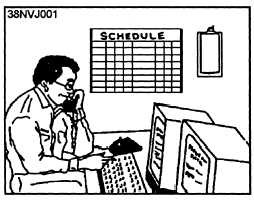l
l
l
l
What is the status of a particular job?
What step is it in?
Has it printed out yet?
Do I have a problem with my terminal?
Logistical Support
The most common user support you will deal with
is logistical support. This will include the need for new
or different equipment to meet the command’s mission
or current equipment that needs corrective
maintenance, or scheduling preventive maintenance.
Forward this type of user support to the division chief
or the division officer, since it requires the relocation or
the acquisition of equipment.
Trouble Calls
As the technician, you will be receiving and
responding to trouble calls. When the user calls to
submit a trouble call, remember to get all the required
information:
* User’s name;
l Type of trouble encountered;
. Date and time; and
l Job being done when the trouble started.
The preceding is only an example of what might be
included on the trouble report at your command. Your
command will have the reporting procedures for
submitting trouble reports, with an example of a trouble
report. Each command has a specific trouble call
format and a tracking procedure.
CUSTOMER LIAISON
When involved with or communicating with the
user (customer), you must use tact and diplomacy. You
must be able to understand and resolve the requests of
the customer. You will also have to deal with
discrepancies and explain problems to customers. You
must be able to independently recognize and resolve
discrepancies and be knowledgeable enough to know
when you can resolve a discrepancy and when to refer
complex problems to your supervisor or leading chief.
MANAGING PRODUCTION
Once you become a shift supervisor, you will be res-
ponsible for managing the scheduling and operation of
all production activities associated with computer process-
ing within your shift. You will monitor the workflow
and make adjustments to meet changing requirements.
1-8
During your work shift, one of your many jobs will
be to monitor job/production status on a regular basis
to determine if there is any actual or potential slippage
in the schedule. It will be your job to balance operations
resources and optimize workflow. There will be times
when you must make adjustments in the sequence of
work (within the constraints of the overall schedule) to
optimize productivity. In computer operations, you
must be able to examine problems that have occurred
during production and initiate corrective action within
operations or with the users.
THE SCHEDULING ENVIRONMENT
AND REQUIREMENTS
Schedulers and production control coordinators are
responsible for coordinating the work efforts of many
people. They prepare, distribute, and maintain produc-
tion schedules for their AIS facility or data center. They
analyze job requirements (old and new) to determine
the impact each job has on production resources. They
also inform the LPO or division chief when scheduling
requirements will exceed computer system resources.
In short, schedulers act as coordinators from the time a
request is received until a job is successfully completed.
The scheduler is responsible for keeping the AIS
facility’s assembly line running as smoothly and
efflciently as possible. Schedulers ensure that jobs are
scheduled and entered into the production job stream at
the proper time. They also ensure that all necessary
resources are available to maintain a constant workflow
throughout the AIS facility.
PEOPLE, PLACES, and THINGS are the
important factors of a scheduler’s job. The first factor
is PEOPLE. You must learn to deal with various
personalities. The second factor is PLACES. You have
to learn what goes on in other fictional work areas.
The third factor is THINGS. You have to cope with run
times, deadlines, computer hardware and software


